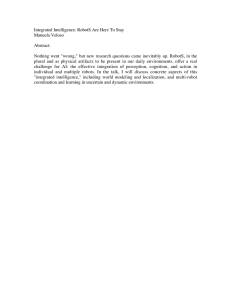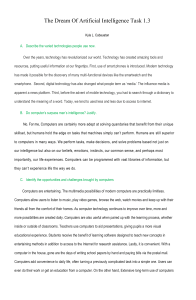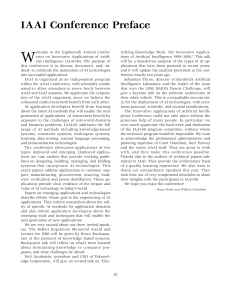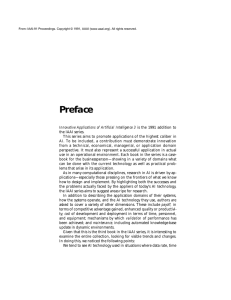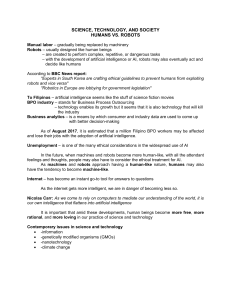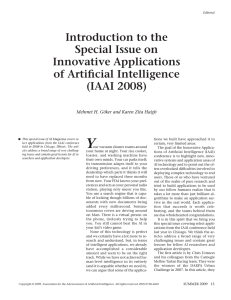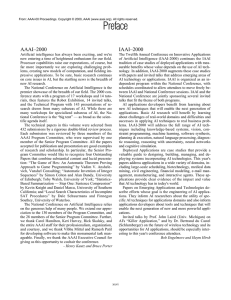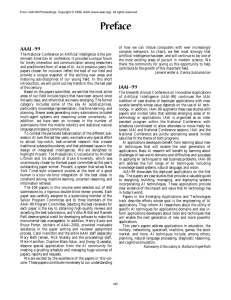No Slide Title - Villanova Department of Computing Sciences
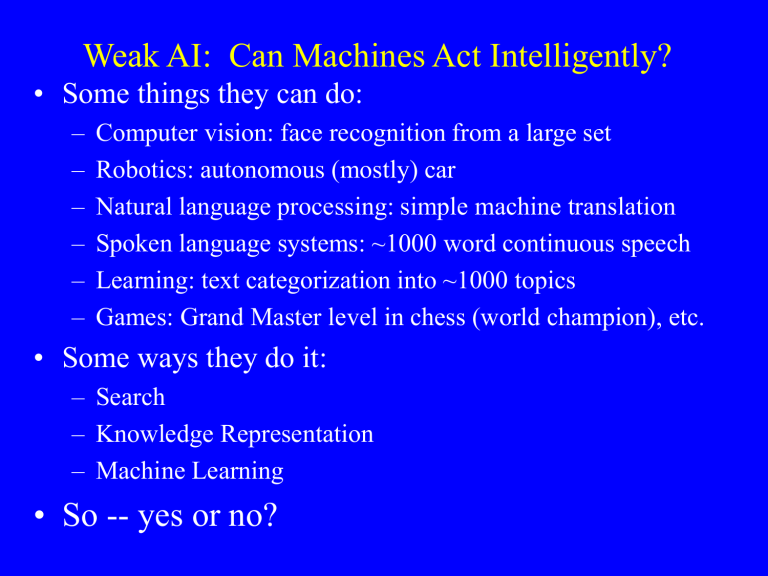
Weak AI: Can Machines Act Intelligently?
• Some things they can do:
– Computer vision: face recognition from a large set
– Robotics: autonomous (mostly) car
– Natural language processing: simple machine translation
– Spoken language systems: ~1000 word continuous speech
– Learning: text categorization into ~1000 topics
– Games: Grand Master level in chess (world champion), etc.
• Some ways they do it:
– Search
– Knowledge Representation
– Machine Learning
• So -- yes or no?
Strong AI: Can Machines Really Think?
• Argument from consciousness, Chinese Room
– Computer programs are formal, syntactic entities
– Minds have mental contents, or semantics
– Syntax is not by itself sufficient for semantics
– Brains cause minds.
• What do we mean by "really think"?
Some Ethical Issues in AI
• The usual automation issues
– loss of jobs
– dependence on technology
– loss of motivation
• Privacy issues
• Loss of accountability
• Danger to humanity
(Asimov's Three Laws,
Vinge's Singularity)
• Do AIs have rights?
What Next?
• 2003: IJCAI Invited Speakers
– Computer Vision: AI or Non-AI Problem
(Kanade, CMU)
– The Past, Present and Future of Web Information Retrieval
(Henzinger,
Google)
– Deploying Information Agents on the Web
(Knoblock, S. Cal)
– Web Intelligence (WI): A New Paradigm for Developing the
Wisdom Web and Social Network Intelligence
(Liu, Hong Kong Baptist University)
– Intelligent Systems in Travel and Tourism
(Werthner, University of Trento, Italy)
– Optimality of Collective Choice in Social Insects and Social
Robots
(Deneubourg, University Libre du Bruxelles)
– Self-reconfiguring Robots: Challenges and Successes
(Rus, Dartmouth)
–
And papers for 2004
AAAI 2004: Some Workshops
• Adaptive Text Mining and Extraction
• Agent Organizations, Coalitions and Teams in
Adaptive MultiAgent Systems
• Challenges in Game AI
• Semantic Web Personalization
• Sensor Networks, Anchoring Symbols to Sensor Data
• Intelligent Agent Architectures
• Collective Mind: Architectures for Fleets of
Equipment that Learn from their Experience
2003 IAAI Deployed Applications
Papers
• Criterion Online Essay Evaluation: An Application for Automated Evaluation of Student Essays
• Mobile Intelligence for Door-to-Door Sales
Support System
• The NASD Securities Observation, New Analysis, and Regulation System (SONAR)
• TPO: A System for Scheduling and Managing
Train Crew in Norway
2003 IAAI Emerging Applications Papers
• Applying Reinforcement Learning to Packet Scheduling in Routers
• The Analogical Thesaurus
• Broadcast News Understanding and Navigation
• Qualitative Spatial Reasoning about Sketch Maps
• Infrastructure Components for Large-Scale Information Extraction Systems
• Building Agents for the Customer Service Front
• Searching for Hidden Messages: Automatic Detection of Steganography
• A Probabilistic Vehicle Diagnostic System Using Multiple Models
• A Knowledge Acquisition Tool for Course of Action Analysis
• Teachable Agents: A Learning by Teaching Environment for Science Domains
• Secure Mobile Agents on Ad Hoc Wireless Networks
• Say Cheese!: Experiences with a Robot Photographer
• Transparent Grid Computing: A Knowledge-Based Approach
• LAW: A Workbench for Approximate Pattern Matching in Relational Data
• Guided Conversations about Leadership
Where Will We Be in 25 Years?
2004 ??
2029 ??
